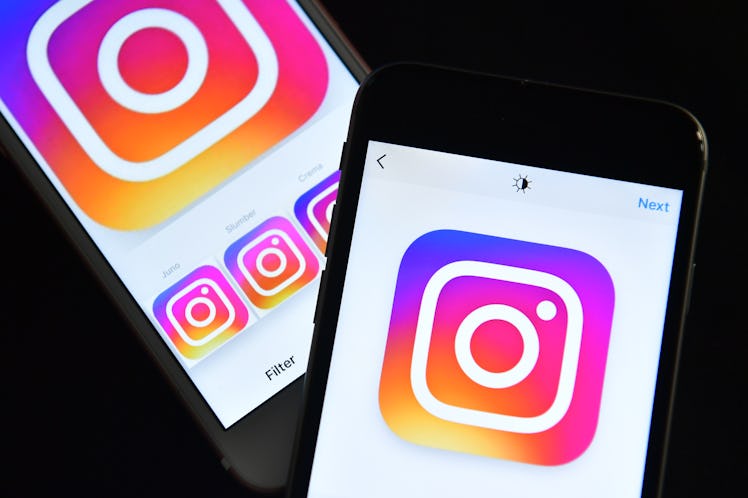
Here's Everything You Need To Know About Instagram's Privacy Policy
On Tuesday, Aug. 20, some Instagram users shared a viral post about a "new" Instagram policy, which stated that the photo-sharing app would apparently change its privacy policy on Aug. 22. The rumored change, which was proven to be a hoax, warned of your Instagram content possibly being "used in court cases and litigation against you," and according to the post, reposting the notice would supposedly prevent the app from using yours. So, what is Instagram' privacy policy? Here's everything you need to know about the app's rules.
The haunting message began to circulate across Instagram in late August. It essentially stated that the supposed new policy would mean that any content you post, even deleted and private content, could be used in court cases and litigation against you in the future. Celebs and public figures hastily copied and pasted it to their IG pages (and have since deleted it), as the post directed users to copy and paste the text to deter the company from using their "pictures, information, messages, or posts, both past and future." Alas, it was all a hoax. On Wednesday, Aug. 21, a spokesperson from Facebook confirmed to Elite Daily that Instagram's current privacy policy is the same as it's always been. They said: "There is no truth to this post."
To debunk future hoaxes, double-check Instagram's website before spiraling into a panic — the app's terms and conditions state the privacy policy, which you agree to by using the app, and how your information is used.
How Instagram Uses Your Data
According to a post from 2017, the most recent policy update, the app uses your information to help you access your profile after signing in, recall information, provide personalized content (like those eerily spot-on ads that show up after you've been looking at certain accounts), improve their service, develop new products, monitor metrics, diagnose issues, update the app, and run special offers.
Instagram's website also states how your information might be shared. In terms of sharing your information, Instagram states the app won't rent or sell your information to third parties without your consent, except for what you agree to when you accept the privacy policy. They may share some information, such as cookies and device identifiers, to businesses that are legally within the same group as Instagram, and may also share the above information with companies that help Instagram provide its service. In the policy, Instagram explains third-party Service Providers may receive info — like cookies, log files, and location data — "under reasonable confidentiality terms," when necessary to the Service provided. And if you remove information posted, copies may still exist in cached and archived pages.
How Instagram Deals With Data Requests
While the app reveals they may access, preserve, and share information from Instagram in regards to legal matters, a Facebook spokesperson shared, "We do not remove content from Instagram simply because law enforcement asked us to. Our approach to content on Instagram — as well as to requests from law enforcement — is to evaluate each situation in accordance with our policies." In terms of providing information like deleted posts and accounts to law enforcement, the guidelines on the Facebook website state: "We do not retain data for law enforcement purposes unless we receive a valid preservation request before a user has deleted that content from our service."
On the Facebook Transparency website, the number of government requests for data in 2018 was 214,449 globally. From January to December, 73.5% of those requests resulted in "some data given." To put that into perspective, per Statista, Instagram notched 1 billion monthly users and 500 million daily users in June 2018. You can look at a breakdown of requests by country on the website. You can also see a full description of all the legal requests, with court-ordered search warrants and subpoenas being the bulk of requests in the United States.
What This Means For Instagram Users
Basically, Instagram's privacy policy, like many companies' rules, is filled with lots of jargon and subsections of information, but in the end, it basically states that you agree to Instagram complying with the law when it comes to government requests for data. In contrast to the fake policy going around, Instagram won't simply hand over your information at will, but rather it will "disclose account records solely in accordance with our terms of service and applicable law," which includes valid subpoenas, court orders, and search warrants.
Of course, when it comes to social media, protecting your information is important, so it's good to know what the rules are. When you agree to the terms of any social networking site, you're likely agreeing to a lot that you don't necessarily understand. In this case, a private account might create more security in terms of not being able to be found by other Instagram users. While that doesn't necessarily mean your account info is off limits in the case of legal matters, you can also know that Instagram will only comply with data requests so far as the company is legally bound to do so. And going off the 2018 numbers, out of 500 million daily Instagram users, 214,449 requests (which is about 0.00043% of all daily users) were made, and out of those requests, 157,705 of them resulted in "some data provided." So, it appears the odds of your account even being involved in a government request are very low.
If you're interested in diving deeper into the data requests Instagram has received, you can go to the Facebook Transparency page, and if you're ever tempted to repost a privacy notice that looks like it was created on a Windows 95 desktop, just resist the urge. Your comments section will thank you.